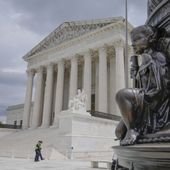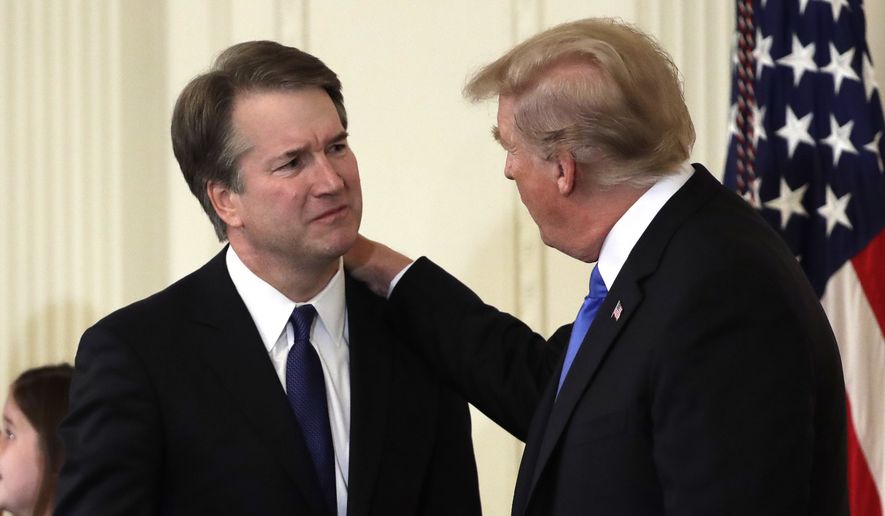President Trump nominated federal appeals court Judge Brett M. Kavanaugh to the Supreme Court Monday night, setting up a furious partisan confirmation battle as he seeks to move the high court firmly under conservatives’ control for decades to come.
In a prime-time announcement at the White House, the president tapped Judge Kavanaugh of the Court of Appeals for the D.C. Circuit after a 12-day whirlwind search to replace the retiring Justice Anthony M. Kennedy.
“Judge Kavanaugh has impeccable credentials, unsurpassed qualifications, and a proven commitment to equal justice under the law,” Mr. Trump said as he introduced the nominee and his family. “There is no one in America more qualified for this position and no one more deserving.”
Judge Kavanaugh, 53, has served on the appeals court since 2006, ruling on some of the nation’s most high-profile cases on a court that is considered a steppingstone to the Supreme Court. He is a favorite of the conservative Washington legal establishment.
He previously worked in the White House counsel’s office under President George W. Bush, and helped to draft special counsel Ken Starr’s report urging the impeachment of President Bill Clinton. The nominee also was a clerk to Justice Kennedy.
Leonard Leo, an outside advisor to the president for judicial selection, said Judge Kavanaugh “is among the most distinguished and respected judges in the country, with nearly 300 opinions that clearly demonstrate fairness and a commitment to interpreting the Constitution as it’s written and enforcing the limits on government power contained in the Constitution.”
SEE ALSO: Susan Collins, Joe Manchin open to Donald Trump Supreme Court nominee Brett Kavanaugh
As the president wrapped up a selection process that included interviews with at least seven candidates, he passed over three other appeals-court judges who were on his short list: Thomas Hardiman of the 3rd Circuit Court of Appeals, Amy Coney Barrett of the 7th Circuit Court of Appeals, and Raymond Kethledge of the 6th Circuit Court of Appeals. Also in the audience in the East Room was Republican Sen. Mike Lee of Utah, who conferred with the president last week on the nomination but didn’t make the short list.
Judge Kavanaugh said he was “deeply honored” to be nominated to replace Justice Kennedy.
“Mr. President, I am grateful to you, and I’m humbled by your confidence in me,” he said.
The nominee said his judicial philosophy is “straightforward.”
“A judge must be independent and must interpret the law, not make the law,” he said. “A judge must interpret statutes as written. And a judge must interpret the Constitution as written, informed by history and tradition and precedent.”
When the president introduced his nominee, the audience gave him a standing ovation for one minute and eight seconds.
“I know the people in this room very well. They do not stand and give applause like that very often. So they have some respect,” said Mr. Trump.
The pick is Mr. Trump’s second to the nation’s highest court, after he selected Justice Neil M. Gorsuch last year to replace Justice Antonin Scalia, who died in 2016. The stakes are even higher with this nomination, as Mr. Trump seizes a rare opportunity for a president to reshape the court for a generation or longer.
Justice Kennedy, who will turn 82 later this month, announced his retirement June 27 as the longtime moderate swing vote on the high court. His retirement leaves the court with two solid blocs — four liberal and four conservative justices — and the next justice could be a pivotal vote on such issues as abortion, gay rights, entitlements, presidential authority, election law, labor rules and government regulation.
The confirmation hearing promises to be a fierce battle. Republicans have a 51-49 majority and can’t afford to lose any votes, as Republican Senator John McCain of Arizona is absent with brain cancer.
Republican Senator Susan M. Collins of Maine has said she won’t support a nominee who would overturn the “settled law” of Roe v. Wade, the 1973 high court ruling that permitted legal abortion. If confirmed, Judge Kavanaugh could serve for three decades or more and have the opportunity to reconsider significant legal precedents, including Roe v. Wade.
Ms. Collins said Judge Kavanaugh “has impressive credentials and extensive experience,” and said she would conduct a “careful, thorough vetting” of the nominee.
Senate Majority Leader Mitch McConnell of Kentucky called the nominee “extremely well qualified.”
At least four red-state Democratic senators were invited to the White House announcement: Heidi Heitkamp of North Dakota, Doug Jones of Alabama, Joe Manchin III of West Virginia and Joe Donnelly of Indiana. They all turned down the invitation; more than a dozen GOP senators attended the event.
The NAACP called Judge Kavanaugh “a dangerous ideologue whose extreme views on civil rights would solidify a far right majority on the Supreme Court.”
“Coming after Neil Gorsuch’s appointment, a Kavanaugh confirmation would re-make the court in President Trump’s own image,” the group said. “This prospect is unacceptable to the American people, and the NAACP is ready to lead the fight of a generation.”
Judge Kavanaugh stood at the White House podium with his wife, Ashley, and their two daughters, Margaret and Liza, and thanked his parents in the audience. He noted that his mother, Martha, once worked as a teacher at largely black public high schools in the District of Columbia before becoming a Maryland state judge.
“Her example taught me the importance of equality for all Americans,” he said.
Judge Kavanaugh’s tenure in the Bush administration became a point of contention during his confirmation hearing for the D.C. federal bench with Sen. Dick Durbin, Illinois Democrat, who called him the “Forrest Gump of Republican politics.” He was confirmed 57-36.
Social conservatives have worried Judge Kavanaugh would be more like Chief Justice John G. Roberts Jr., who is viewed as a moderate Republican on the high court, rather than aligning with the other Republican-appointed justices. Conservative former Sen. Rick Santorum of Pennsylvania said the nomination won’t energize the Republican base.
“It seems like Trump just bowed to the elite in Washington,” Mr. Santorum said on CNN. “He is the establishment pick.”
While on the D.C. Circuit, the judge ruled against upholding the Affordable Care Act’s contraceptive mandate, upheld prayer before a presidential inauguration, and also said a court can begin its session with “God Save the United States and this honorable Court.”
Justin Walker, a former clerk to Judge Kavanaugh and Justice Kennedy, said the nominee is a staunch defender of the Second Amendment, dissenting in a case where he argued that originalism and the Supreme Court’s precedent suggests there’s a right to own a semi-automatic rifle.
“He has not been hesitant to take very strong stands in defense of conservative legal principles,” Mr. Walker said.
But liberals point to a 2009 Minnesota Law Review article authored by Judge Kavanaugh, in which he said presidents should be exempt from time-consuming investigations and litigation that distract from national security issues and poorly serve the public interest. And in 1998, he wrote that “Congress should establish that the President can be indicted only after he leaves office voluntarily or is impeached by the House of Representatives and convicted and removed by the Senate.”
With Mr. Trump’s campaign under investigation for allegedly colluding with Russian officials during the 2016 election, the progressive Alliance for Justice argued that Judge Kavanaugh would not stand up to the commander-in-chief.
“Kavanaugh’s personal writings show that he would allow Donald Trump’s abuses of power to go unchecked,” the organization said.
Senate Minority Leader Charles E. Schumer, New York Democrat, warned in a pre-emptive attack Monday that the nominee must “share their personal views” on abortion with senators to win confirmation.
In a major departure, Mr. Schumer said senators should demand that the nominee agree to uphold the constitutional right to abortion established by the 1973 Roe v. Wade decision.
Even as Mr. Trump was announcing his decision, a conservative group launched an ad campaign in four states with Democratic senators in support of the nominee. The Judicial Crisis Network will spend $1.4 million on national cable, digital ads supporting the nominee in Alabama, Indiana, North Dakota and West Virginia.
Mr. Trump carried all four states in 2016. In three of the states targeted, incumbent Democratic senators are running for re-election this year: Joe Donnelly of Indiana, Heidi Heitkamp of North Dakota and Joe Manchin III of West Virginia. Sen. Doug Jones of Alabama faces re-election in 2020.
The conservative group Americans for Prosperity, affiliated with the Koch network, plans a campaign of media and grass-roots events across the nation in support of the nominee.
Liberal groups such as Demand Justice also are mounting multimillion-dollar ad campaigns against the nominee, targeting advertising and activism heavily on two Republican senators: Lisa Murkowski of Alaska and Susan M. Collins of Maine. NARAL Pro-Choice America announced plans to pay for full-page ads in four Maine newspapers highlighting the abortion issue.
The White House announced earlier Monday that Jon Kyl, a former Republican senator from Arizona, will guide the nominee through the confirmation process. Mr. Kyl, who was a member of the Senate Judiciary Committee, is a senior lawyer at the Covington firm.
White House officials hope to have the nominee confirmed and on the bench in time for the Supreme Court’s next term, which begins Oct. 1.
Before the identity of the nominee was announced, many Senate Democrats vowed to vote against confirmation.
Sen. Robert P. Casey Jr. of Pennsylvania, who is running for re-election this year, objected to having a nominee from the president’s list of 25 prospective candidates “dictated to him by The Heritage Foundation.”
Mr. Trump followed the same process as he did in nominating Justice Gorsuch, considering candidates from the list of conservative judges that he initially compiled during the presidential campaign in 2016 after conferring with informal advisers from the conservative Federalist Society and The Heritage Foundation.
• Dave Boyer can be reached at dboyer@washingtontimes.com.
• Alex Swoyer can be reached at aswoyer@washingtontimes.com.




Please read our comment policy before commenting.